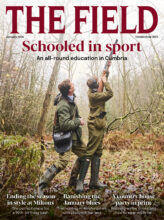Janet Menzies offers some expert advice on when to start training a gundog puppy.
The hardest question I am ever asked about training gundogs is: “When?” People want to know when they should start the young puppy with its basic obedience training or when they should introduce live game. Most of all they want to know when they can take the dog shooting. (Read when to get a gundog puppy.)
When to start gundog puppy training? It depends on the puppy
So much depends on the dog’s aptitude. Two extremes recently presented themselves which made me realise that novice handlers do need a ballpark figure of what goals they should be achieving when. A lady was telling me about the family’s first springer pup, and when I sheepishly admitted to some knowledge in the area, she asked me about training, explaining: “He’s going to be trained to the gun, but we’ve been told to wait until he is two years old before we start.” (Read: Where should you send your gundog puppy to school?)
It depends what you mean by “start training”, but obviously two years old is too late to start specific gundog training. If you intend to use your dog in the shooting field, you must train with that in mind from the day you get the puppy home.
The other extreme was the shooting acquaintance who complained his springer bitch was gun-shy when he was out hedgerow-bashing with her. It transpired she was only six months old – far too young to be shot over in that way. At that age a dog should be hearing the gun fired occasionally and, if he is a mature, quick learner, may be having dummies “shot” for him, or a rabbit – but not full-scale rough-shooting. (Read how to introduce your puppy to an older dog.)
Key stages
Start teaching early play-learning to your pup as soon as he is weaned and toddling about at home (in practice eight to 10 weeks old). Getting him to know his name; using the feed bowl to teach “sit”(or “hup”); and encouraging him to come to you when asked by his name are all lessons that are learnt in a play context. We tend to overlook the importance of these exercises, but remember that even advanced gundog work is little more than a combination of the dog sitting/stopping when asked and coming/returning when called.
Even if you did little more than this for the next four months of the dog’s life, but got them perfect, you would be nearer to a trained gundog than you think. Much of the dog’s later training centres around getting it to obey these basics in a range of scenarios.
Little retrieving games
As your pup gets stronger and bolder, start introducing little retrieving games – still insisting on those first basic commands. Don’t overdo it, even if it is pup’s favourite game. You can begin hand and whistle commands to back up your voice almost immediately. It’s like teaching a child a foreign language – easily picked up if introduced at an early age.
Spend the next two or three months messing around with these basics in all sorts of places and situations, and gradually add in a few extras such as the lead, heeling and eventually staying. Aim to have the pup confident on this full repertoire by the time it is five months old.
The next six months will be spent on the more demanding tasks of teaching hunting, steadiness, handling and gun awareness. It is hard to predict how long this “secondary school” stage of training will take. Some youngsters will pick up retrieving lessons easily but find it hard to be steady. Others will take steadiness on board but not hunt well.
This is the time when you must adjust to the dog rather than having age-related goals in mind. Just plod steadily through the aspects you need to achieve, and hope that by the time it is around 11 months or a year old, the youngster is ready to be introduced to training in controlled live-game and shooting situations. This graduation stage leading up to work in the field, is often quicker than expected if the foundations were thorough, and most young dogs will be ready to start going shooting at around 14 to 16 months.
Key stages for training a gundog puppy
- At weaning – teach name, come , and sit
- Early puppyhood – teach verbal commands, support with hand gestures/whistle
- Six months (approx) – add retrieving and staying but keep at play level
- Eight months (approx) – insist on obedience, begin simulated fieldwork exercises
- First birthday – full field training including rabbit pen, shot and game
- Eighteen months – first shooting season in the field, don’t let the youngster get too involved; keep pressure off and backtrack if necessary
- Two years – beginning to mature, expect more





